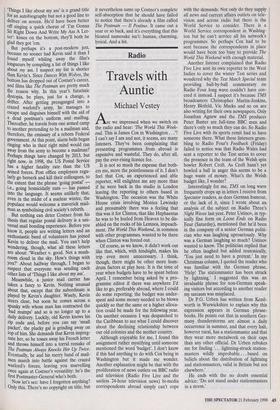Radio
Travels with Auntie
Michael Vestey
Are we impressed when we switch on the radio and hear: 'The World This Week- end. This is James Cox in Washington . . .'? I can't say I am and nor, it seems, are many listeners. They've been complaining that presenting programmes from abroad is expensive and wasteful. They do, after all, pay the ever-rising licence fee.
It is not so much the expense that both- ers me, more the pointlessness of it. I don't feel that Cox, an experienced and able reporter, will enlighten me any more than if he were back in the studio in London leaving the reporting to others based in Washington. The occasion was the White House crisis involving Monica Lewinsky and presumably there was a feeling that this was it for Clinton, that like Hephaestus he was to be hurled from Heaven to be dis- abled on the rocks of his Lemnos, impeach- ment. The World This Weekend, in common with other programmes, wanted to be there when Clinton was forced out.
Of course, as we know, it didn't work out like that, which, with hindsight, makes his trip even more unnecessary. I think, though, there might be other more hum- drum factors at play here. It is the time of year when budgets have to be spent before April. I remember being asked by a pro- gramme editor if there was anywhere I'd like to go, preferably abroad, where I could do some reporting; the budget was under- spent and some money needed to be blown quickly so that the same or a higher alloca- tion could be made for the following year. On another occasion I was despatched to the Caribbean to see what I could discover about the declining relationship between our old colonies and the mother country.
Although enjoyable for me, I found this assignment rather mystifying until someone mentioned the word `budget'. I don't know if this had anything to do with Cox being in Washington but it made me wonder. Another explanation might be that with the proliferation of news outlets on BBC radio and television (Radio Five Live and the useless 24-hour television news) bi-media correspondents abroad simply can't cope with the demands. Not only do they supply all news and current affairs outlets on tele- vision and across radio but there is the World Service to consider. There is a World Service correspondent in Washing- ton but he can't service all his network's programmes. So perhaps Cox had to be sent because the correspondents in place would have been too busy to provide The World This Weekend with enough material.
Another listener complained that Radio Five Live sent its own reporter to the West Indies to cover the winter Test series and wondered why the Test Match Special team providing ball-by-ball commentary on Radio Four long wave couldn't have cov- ered it instead. I suspect it's because TMS broadcasters Christopher Martin-Jenkins, Henry Blofeld, Vic Marks and so on are also writing for their own newspapers. Only Jonathan Agnew and the TMS producer Peter Baxter are full-time BBC men and there's only so much they can do. So Radio Five Live with its sports remit had to have someone there. What these listeners grum- bling to Radio Four's Feedback (Friday) failed to notice was that Radio Wales had sent a reporter to the Test series to cover the presence in the team of the Welsh spin bowler Robert Croft. As Croft hasn't yet bowled a ball in anger this seems to be a huge waste of money. What's the Welsh budget like, I wonder?
Interestingly for me, TMS on long wave frequently crops up in letters I receive from Spectator readers, as does German humour, or the lack of it, since I wrote about an analysis of the subject on Radio Three's Night Waves last year. Peter Ustinov, in typ- ically fine form on Loose Ends on Radio Four (Saturday), mentioned that he'd been in the company of a senior German politi- cian who was laughing uproariously. Why was a German laughing so much? Ustinov wanted to know. The politician replied that he often laughed but added teutonically, `You just need to have a pretext.' In my Christmas column, I quoted the reader who was familiar with the German phrase, `Help! The stationmaster has been struck by lightning.' I suggested this was an invaluable phrase for non-German speak- ing visitors but according to another reader my sarcasm was misplaced.
Dr P.G. Urben has written from Kenil- worth in Warwickshire to explain why this expression appears in German phrase- books. He points out that in southern Ger- many thunderstorms are almost a daily occurrence in summer, and that every halt, however rural, has a stationmaster and that they wear more metalwork on their caps than any other official. Dr Urben rebukes me for finding lightning-struck station- masters wildly improbable ... based on beliefs about the distribution of lightning and stationmasters, valid in Britain but not elsewhere.'
He ends with the no doubt essential advice: 'Do not stand under stationmasters in a storm.'


























































 Previous page
Previous page